
With the expansion of Web 3 usability, crypto users worldwide are looking for a platform they can trust and back up their digital assets.
For customers who wish to store their digital assets and have access to a variety of decentralized applications, the Web 3 Crypto wallet is a great option. Crypto wallets are safe places to save, manage, and conduct cryptocurrency transactions.
The fast adoption of blockchain networks across different industries has boosted the global crypto wallet market, indicating a better opportunity for investors and entrepreneurs looking to profit from the blockchain market with Web 3 crypto wallet development.

Source: Grand View Research
In this blog, we will discover how to develop a Web 3 crypto wallet step by step and explore must-have features and the required tech stack.
What Is A Web 3 Crypto Wallet?
Web 3 Crypto wallet stores digital assets such as tokens, cryptocurrencies, and NFTS. Crypto wallets enable users to transact on various blockchain networks such as Ethereum, Polkadot, Solana, etc.
Based on the nature of crypto wallets, private keys can be managed by users or cryptocurrency exchanges. For noncustodial wallets, users are responsible for securing their private keys. While for custodial wallets, the cryptocurrency exchange manages the private keys of their users.
Moreover, crypto wallets enable users to engage with Blockchain-based applications and services securely and seamlessly. Also, crypto wallets play a pivotal role in online transactions, allowing anyone to access blockchain networks with their digital assets, such as NFTs and cryptocurrencies.
Key Features For Web 3 Crypto Wallet
A Web 3 Crypto wallet must enhance functionality and fulfill your business requirements. Here are some essential features you can include in your crypto wallet app
1. User Authorization
Crypto wallets are prone to many security attacks. Therefore, it is always best to enhance user security by implementing Multi-factor or two-factor authentication (2FA or MFA).
Both of these authentication methods will provide an additional security layer to your crypto wallet app. Moreover, user authorization will help you ensure that the digital assets of users are protected from unauthorized access.
Also, try to stay updated with emerging security threats to continuously improve your authentication mechanisms by adapting your platform towards various evolving risks.
2. QR Code Scanner
The feature will add convenience, simplicity, speed, and security to your crypto wallet app transactions. QR Code scanner will enable your users to automatically scan their wallet address and public keys for enhancing cryptocurrency transactions with just a single click.
The users can scan the QR code instead of typing all the long characters of public cases, which results in faster cryptocurrency transactions between users.
3. Multiple Cryptocurrencies Support
Offering support to multiple cryptocurrencies in a crypto wallet is crucial for enhancing versatility and offering users a comprehensive solution for managing their digital assets.
Moreover, offering multiple cryptocurrency support will help you attract a broad range of audiences that are interested in purchasing, holding, trading, or selling different types of cryptocurrency, such as Bitcoin, Ethereum, Solana, PolkaDot, etc.
4. Push Notifications
A must-have feature that will help your users to stay alerted and notified of different crypto transactions within their wallet, such as failure or completion of transactions and price changes in their held crypto assets.
Push notification is a great way to ensure that users will do not miss any important events and updates throughout an app.
5. Latest Conversion Rates
Users can access the latest conversion rates between different cryptocurrencies and can benefit from Swapping or trading between different cryptocurrencies.
The latest conversion rates feature helps users calculate transaction fees based on ever-changing conversion rates to facilitate payments between different cryptocurrencies with actual and accurate prices.
6. Blockchain-Based Transactions
Enable your users to view their available balance in their entire transaction history in your Web 3 crypto wallet app. Offering blockchain-based transactions will help your users to transfer and receive digital currencies via crypto applications in an entirely fast and tamper-proof manner.
7. Optional Session Logout
The feature will help you enhance the security of your platform. Optional season logout will sign out inactive users from your app after a fixed duration of their inactivity, and they will need to re-login if they want to use the app again.
Top 5 Web 3 Crypto Wallets
There are many best Web 3 crypto wallets available in the market that allow their users to store and access digital assets such as cryptocurrencies and NFTs.
Based on the support of a wide range of crypto assets and Defi/staking support, the best crypto wallets are as follows:
1. Exodus
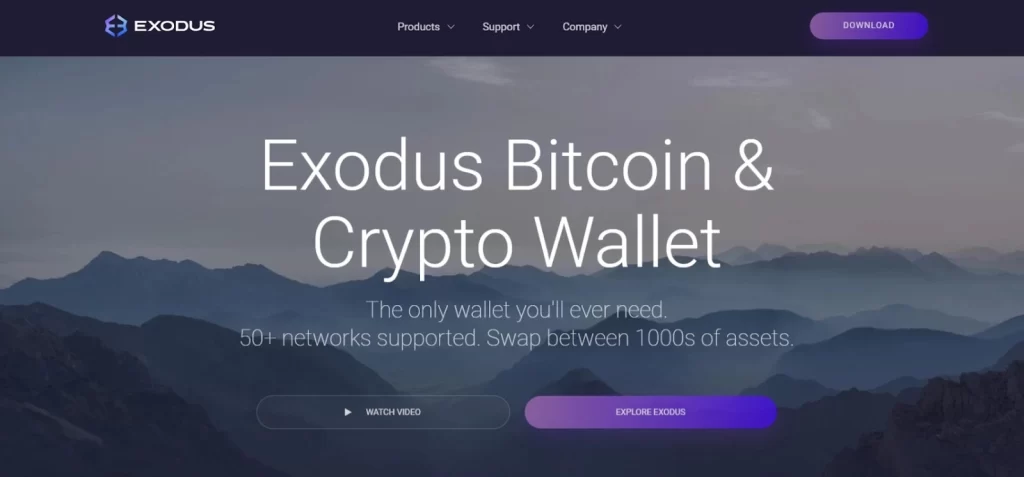
One of the most well-known cryptocurrency wallets, allows users to buy, trade, or stake cryptocurrencies directly from their wallets.
Moreover, the platform integrates with Trezor wallet to help people quickly move their crypto from hot to cold storage and supports about 250 cryptocurrencies.
| Supported Assets | More than 250 |
| Allows cold storage conversion | Yes |
| Staking/DeFi support | Yes |
2. Coinbase Wallet
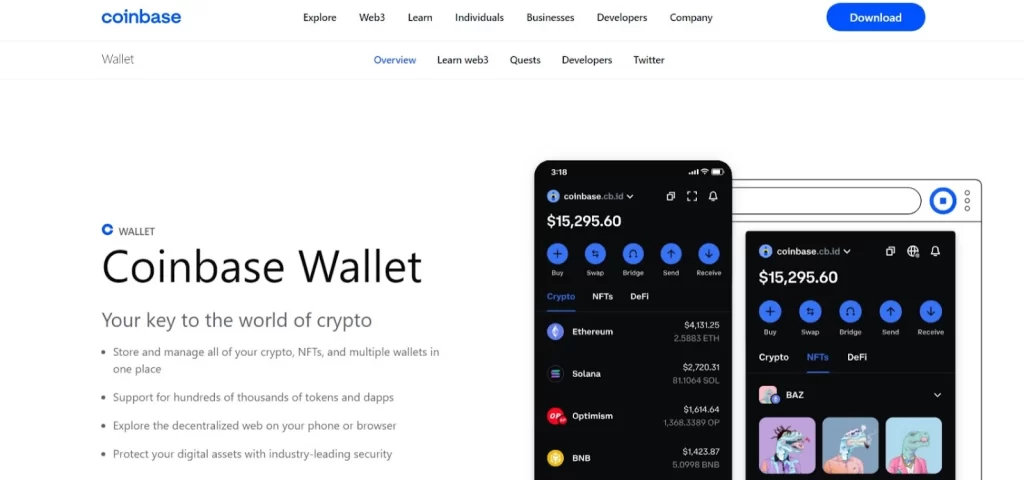
The largest US-based crypto exchange that allows users to store cryptocurrencies in wallets rather than keeping them in the custody of Coinbase.
Coinbase Wallet is a separate product that easily integrates with the company’s exchange, offering a feasible option for users who haven’t used a noncustodial wallet before.
The platform can be accessed through applications and desktops. Moreover, their browser extension also provides connectivity to the Ledger hardware wallet.
| Supported Assets | More than 1,000 |
| Allows cold storage conversion | Yes |
| Staking/DeFi support | Yes |
3. Meta Mask
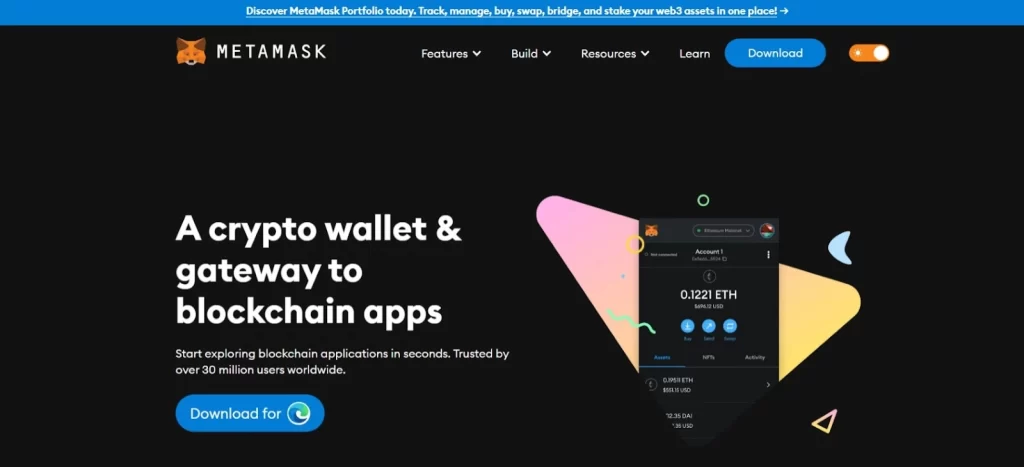
A free and open-source platform to store any digital assets built on the Ethereum blockchain. The platform integrates with many Web 3 applications that require crypto transactions for facilitating payments.
Metamask can be accessed through mobile applications and browsers. However, they don’t provide any desktop app or offer crypto staking directly in their app.
| Supported Assets | More than 700,000 |
| Allows cold storage conversion | Yes |
| Staking/DeFi support | Through connected apps |
4. Trust Wallet
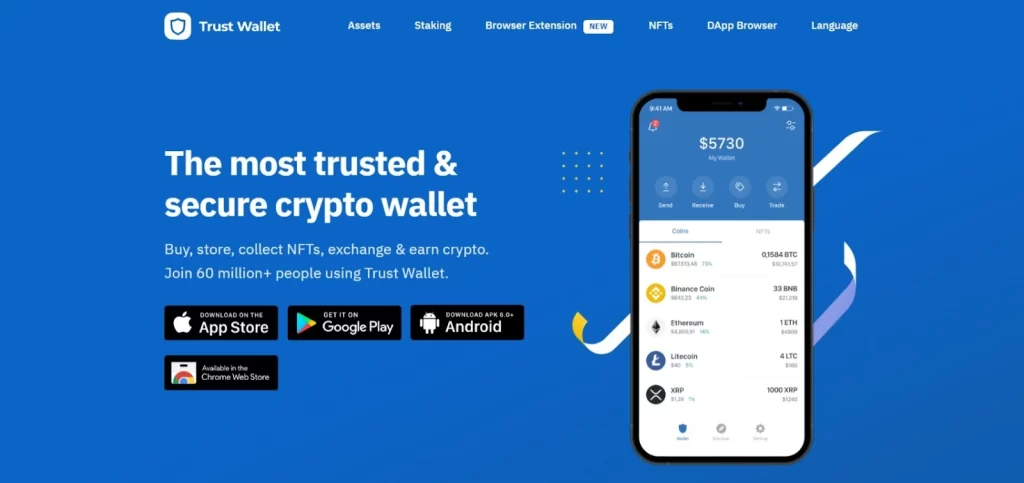
Trust Wallet was developed by Binance, one of the largest cryptocurrency exchanges that allows customers to control their crypto securely.
The wallet works with 65 blockchain networks and supports over 4.5 million assets. Moreover, the platforms enable their users to easily carry out transactions through exchanges and connect to any assets they are looking to hold online.
| Supported Assets | More than 1,000,000 |
| Allows cold storage conversion | No |
| Staking/DeFi support | Yes |
5. Crypto.com DeFi Wallet
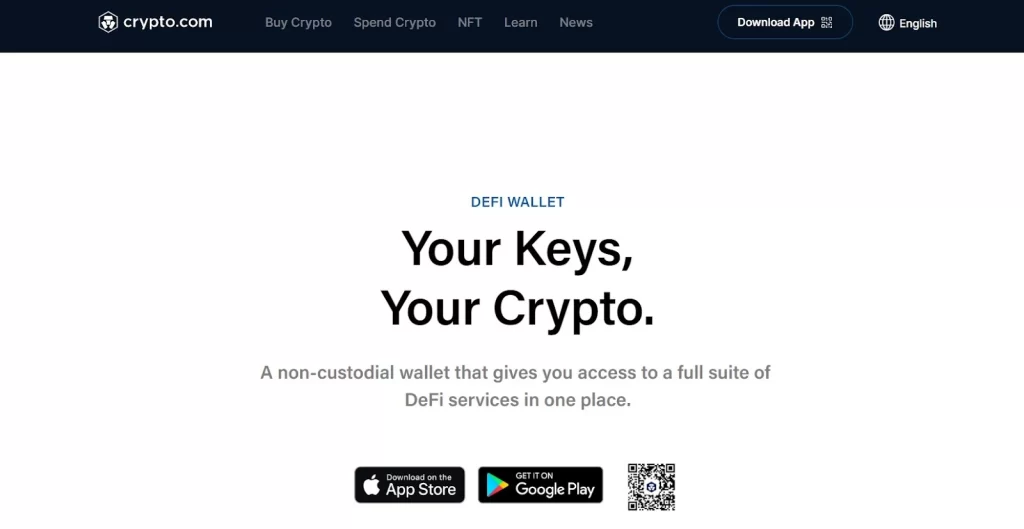
The platform allows its users to hold their crypto holdings and interact with various DeFi products both on Crytpo.com’s mobile app and browser extension.
Crypto.com Defi wallet offers a decentralized platform where users can lend and access various blockchain-based financial products without relying on the central broker.
Moreover, the users can use their crypto holdings to interact with various DeFi products and provide integration with Ledger (a well-known crypto hardware wallet)
| Supported Assets | More than 1,000 |
| Allows cold storage conversion | Yes |
| Staking/DeFi support | Yes |
How to Develop A Web 3 Crypto Wallet?
There is a requirement of careful planning, coding, and testing to ensure the Web 3 crypto wallet security during its development stage.
It would be best to consult with a reliable blockchain development company to ensure the success of your Web 3 wallet development. The basic steps to create your crypto wallet are as follows:
1. Conceptualization and Planning
This stage will involve defining the purpose and target audience of your Web 3 crypto wallet. Also, determine the key features and functionality you want to include in your crypto wallet and the list of supported blockchain platforms such as PolkaDot, Ethereum, Binance, Smart Chain, etc.
2. Technology Stack Selection
The selection of the technology stack will depend on your project needs and requirements, such as selected blockchain platforms and technology expertise of selected blockchain development companies, libraries, frameworks, and programming languages for front-end and back-end development.
3. Design User Interface (UI)
The simple and easy-to-use UI will enable your users to access and use all the features and functionalities of your Web 3 crypto wallet.
Therefore, it is crucial to ensure user-friendly and responsive designs that cater to both beginners and experienced users interested in using your platform for storing and accessing their digital assets.
4. Blockchain Integration
Ensure the compatibility of your crypto wallet with multiple blockchain networks using SDKs, APIs, or node software to help you acquire more users to your platform from different blockchain networks.
Maintain necessary features like transaction signing, account creation, balance checking, and other features based on the features and functionalities you are considering offering for your users.
5. Security Implementation
Securing the digital assets and sensitive information of your users is crucial for gaining and maintaining the trustability of your Web 3 crypto wallet. Therefore, consider implementing secure methods such as authentication, passwordless logins, biometric authentication, or hardware wallet integration.
Also, consider implementing two-factor authentication to enhance the security of your platform and utilizing encryption methods to enhance the crypto wallet security.
6. Wallet Functionality
Develop and implement must-have features for crypto wallets, such as sending and receiving cryptocurrency, viewing transaction history, and managing wallet addresses.
Also, consider supporting additional functionalities like contract interactions, token management, and decentralized application in addition to offering backup for private keys, including mnemonic phrases and private key exports.
7. Testing and Quality Assurance
Quality Assurance and testing will help you ensure that your platform is free from any technical glitches or drawbacks. Consider conducting rigorous testing for wallet applications, including integration testing, usability testing, and unit testing.
Also, test for edge cases and compatibility with various devices and browsers in addition to figuring out and fixing any security vulnerabilities to your crypto wallet.
8. Deployment
Make your crypto wallet available to access for your users by selecting the appropriate deployment environments such as app store and web hosting. Additionally, ensure the proper database and server configuration for handling user data securely.
9. Maintenance and Updates
Continuously improving your crypto wallet is crucial to stay competitive. Therefore, consider monitoring and maintaining your wallet performance by addressing user feedback and staying updated with blockchain changes and upgrades.
Web3 Crypto Wallet Tech Stack
The tech stack selection for crypto wallet development depends on various crucial aspects such as blockchain networks, use cases, etc.
However, the general overview for tech stack selection of basic Web 3 crypto wallet development is as follows.
1. Programming Languages
- JavaScript: Common for web and mobile wallets.
- Python, Go, or Rust: Often used for building node software for cryptocurrencies like Bitcoin and Ethereum.
- Java and Kotlin: For Android mobile wallets.
- Swift: For iOS mobile wallets.
- C/C++: For low-level wallet development, especially in hardware wallets.
2. Cryptography
- Cryptographic libraries: OpenSSL or specialized cryptography libraries for key generation, signing, and encryption.
3. User Interface (UI)
- HTML/CSS/JavaScript: For web-based wallets.
- React, Vue.js, or Angular: Popular JavaScript frameworks for building web wallet interfaces
- React Native or Flutter: For cross-platform mobile wallet development
- SwiftUI or UIKit: For native iOS wallet apps
- Jetpack Compose or XML-based layouts: For native Android wallet apps
4. Security
- Secure coding practices to protect against common vulnerabilities like SQL injection, XSS, and CSRF
- Secure enclave or hardware security module (HSM) integration for hardware wallets
5. Blockchain Integration
- APIs: Cryptocurrency wallets often integrate with blockchain APIs for accessing transaction data and broadcasting transactions
- Blockchain-specific libraries: Libraries like web3.js for Ethereum or BitcoinJS for Bitcoin are used for blockchain interaction
6. Network Communication
- Real-time updates: Networking libraries like Axios for HTTP requests or WebSockets
7. Database
- Storing user wallet data: SQLite, MySQL, or PostgreSQL
8. Blockchain Explorer Integration
- Integration with blockchain explorers for viewing transaction history and balances.
9. Authentication and Authorization
- Securing user access: OAuth, JWT, or other authentication mechanisms
10. External Libraries
- QR Code Scanning: Libraries for scanning and generating QR codes for wallet addresses and transactions.
- Payment Processing: Integration with payment processors or third-party APIs for facilitating payments.
Conclusion
A cryptocurrency wallet is a fundamental tool for individuals and organizations seeking to participate in the world of digital assets. These wallets are secure containers for storing, managing, and transacting with cryptocurrencies.
Web 3 crypto wallet serves as a secure container for managing, storing, and transacting cryptocurrencies and act as a fundamental tool for organization and individuals seeking to participate in a world of decentralized digital assets. However, Web 3 crypto development involves not only technical challenges but also requires a focus on usability, security, and continuous improvement.
You can contact us if you are looking for a team of blockchain development experts with expertise across Web 3 crypto wallet development. By working with us, you can ensure that your Web 3 crypto wallet will be developed with all the essential features and functionalities on your preferred blockchain network to let your business stay competitive in the market.
Contact us today to learn more about how we can help you establish and grow your business with Web 3 crypto wallet development.
FAQ
Q. What Is A Web3 Crypto Wallet?
A. Web 3 Crypto wallet stores private keys, cryptocurrencies, and NFTS and enables users to transact on various blockchain networks such as Ethereum, Polkadot, Solana, etc., and allows users to engage with Blockchain-based applications and services securely and seamlessly.
Q. What are the best Web 3 crypto wallets?
A. Exodus, Coinbase Wallet, Metamask, Trust Wallet, and Crypto.com are some of the best Web 3 crypto wallets.
Q. How big is the digital wallet market?
A. The global market for Web 3 crypto wallets was estimated to be worth $8.42 billion in 2022 and is expected to grow at a CAGR of 24.8% from 2023 to 2030.













Gaurav Patil